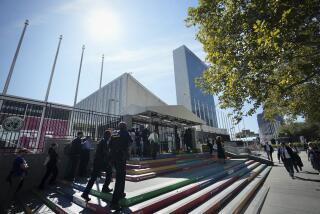White House Relationship With U.N. Chief Starting to Resemble Rivalry
- Share via
WASHINGTON — In late 1996, the Clinton administration lobbied intensely behind the scenes to ensure that Kofi Annan, an obscure Ghanaian diplomat, would replace then-U.N. Secretary-General Boutros Boutros-Ghali--an Egyptian who, in the U.S. view, had failed to reform the world body and treated it as his personal fiefdom.
Washington saw Annan, a U.N. veteran educated in the United States, as someone who could finally streamline the world body and craft a U.S.-friendly strategy for the post-Cold War world.
But as President Clinton greets Annan at the White House today, that alliance has begun to look more like a rivalry, particularly on two issues: Iraq and U.N. finances.
Ever since Annan signed a deal with Baghdad last month to reinstate U.N. weapons inspections, American officials have been uneasy with his new relationship with Iraq--a relationship often at variance with American policy.
“King Kofi,” as one U.S. official called him, is becoming an independent diplomatic force--the same ambition Washington faced in Boutros-Ghali.
In turn, Annan is dismayed that while he has upheld his promise to impose reforms on the U.N., the United States has failed to deliver on Clinton’s pledge to repay at least some of more than $1.3 billion it owes in back dues. The resulting shortage is, as Annan sees it, crippling his ability to reposition the U.N. for the 21st century--ironically, in ways often favored by the United States.
So, when they meet today, the two men will exchange serious messages.
The U.S. message on Iraq is threefold: Iraq should be contained through economic and military restrictions for the foreseeable future. U.N. weapons inspectors must be unfettered--unrestrained by either the government of President Saddam Hussein or the hierarchy of the United Nations. And the United States reserves the right to retaliate militarily for Iraqi violations.
While Annan has praised Clinton’s Iraq policy of diplomacy backed by the threat of force, his actions have moved him closer to the approach favored by France, Russia, China and some Arab nations: using incentives as well as threats to obtain Baghdad’s cooperation.
U.S. officials also fear that Annan will back an early lifting of economic sanctions against Iraq. The U.S. wants those to continue as long as Hussein is in power, while most U.N. members believe they should be eased if and when inspectors certify that Baghdad no longer has chemical, biological or nuclear weapons.
The administration also is concerned that Annan may be reining in the inspectors.
In response to written complaints by Iraqi Foreign Minister Mohammed Said Sahaf, the U.N. is “reviewing” comments made in a Cable News Network interview by several inspectors, Annan spokesman Fred Eckhard said Tuesday. He denied that Annan struck any secret agreement in Baghdad to gag inspectors but said an employee conduct code precludes them from discussing classified information.
(Also Tuesday, Eckhard said an inspection team led by American Scott Ritter had completed a mission to Iraq that included unimpeded visits to eight facilities deemed “sensitive” by the Iraqis. That term usually signifies a military or intelligence facility. Other officials confirmed that one of the sites was the Iraqi Defense Ministry.)
Annan’s position was not enhanced when he said Sunday on ABC-TV that Washington would be “required” to consult with other Security Council members before taking any military action if Iraq violated the latest accord; Clinton has often said that existing U.N. resolutions provide all the approval needed for a punitive U.S. strike.
At a broader level, the administration is concerned that Annan’s Iraq mission presages a more interventionist role for the secretary-general in other world crises, such as the deadlocked Arab-Israeli peace process. Annan soon will visit Israel, Egypt, Syria and Lebanon, where Arab and European envoys say he will be pressed to intervene in talks dominated by Washington.
“The strengthening of Kofi Annan could pose a serious problem for Washington. The momentum is already in his favor,” said a French envoy. “Many countries think he averted a conflict the United States wanted, and they want him to work diplomatic miracles elsewhere.”
Annan will be surrounded here, however, by experts on U.N. reform and finances. That may reflect the priority of his visit: the organization’s shaky finances. The U.N. leader plans to deliver a straightforward plea--he expects Washington to meet its overdue financial commitment.
The U.S. funds 25% of the U.N. budget annually under a formula based mainly on national wealth. But the U.S. has failed to meet the 25% level several times in the last two decades, leaving it more than $1.3 billion in arrears.
A senior U.N. official said Tuesday that Annan will tell Clinton that chances for further U.N. reform--and a reduction in U.S. dues to 20%, as is favored by the administration--hinge on repayment of arrears.
Last year, the administration struck a deal with Republican leaders in Congress to pay more than $800 million in back dues. But the legislation was hung up when antiabortion language unrelated to the U.N. and unacceptable to the administration was attached to the bill. Now, the administration is trying to revive the measure and increase the funding to more than $1 billion. But officials acknowledge that the chances of its passage are still dicey.
Meanwhile, the U.N.’s financial situation has reached a “critical” stage, its top money man said Tuesday. “We’re hanging on by our fingernails,” said Joseph Connor, undersecretary-general for administration.
Despite Clinton and Annan’s differences, U.S. officials predict that their meeting will be amiable.
“The president and Kofi have a lot of good personal chemistry, and this visit will hopefully spill over into even more cooperative strategies on [financial] arrears and Iraq,” U.S. Ambassador to the U.N. Bill Richardson said.
Wright reported from Washington and Turner from the United Nations.
More to Read
Sign up for Essential California
The most important California stories and recommendations in your inbox every morning.
You may occasionally receive promotional content from the Los Angeles Times.













